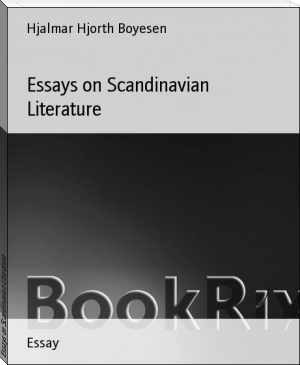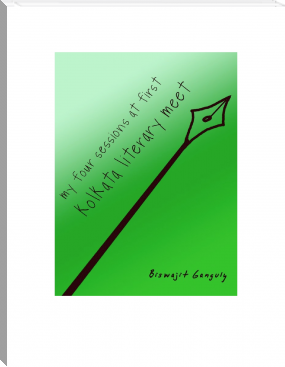Essays on Scandinavian Literature - Hjalmar Hjorth Boyesen (best books to read non fiction txt) 📗

- Author: Hjalmar Hjorth Boyesen
Book online «Essays on Scandinavian Literature - Hjalmar Hjorth Boyesen (best books to read non fiction txt) 📗». Author Hjalmar Hjorth Boyesen
There was at that time a general revival of interest in the so-called saga-age. The Danish poet, Oehlenschläger, had published his old-Norse cycle of poems, "Helge," which aroused a sympathetic reverberation in Tegnér's mind. The idea took possession of him that here was a theme which lay well within the range of his own voice, and full of alluring possibilities. Accordingly he chose the ancient "Saga of Frithjof the Bold," and resolved to embody in it all the characteristic features of the old heroic life. And what Oehlenschläger had attempted to do, and partly succeeded in doing, he accomplished with a completeness of success which was a surprise to himself. No sooner had "Iduna," the organ of the Gothic League, published the first nine cantos (1821), than all Sweden resounded with enthusiastic applause; and even from beyond the boundaries of the fatherland came voices of praise. When the completed poem appeared in book-form, it was translated into all civilized languages, and everywhere, in spite of the translators' shortcomings, it was hailed with delight. Not only England, France, and Germany hastened to appropriate it, but even in Spain, Greece, and Russia tears were shed over "Ingeborg's Lament," and tender bosoms palpitated with sympathy for Frithjof's sorrows. I know a dozen English translations of "Frithjof's Saga" (a friend of mine, who is a bibliophile, assures me that the exact number is at present twenty-one), and of German versions the number is not very much less. A Norwegian (or rather Danish) rendering was presented to me on my twelfth birthday; and the sentiment which then most forcibly appealed to me was, as I vividly remember, embodied in the following verse, in which Björn chides his friend's grief for the loss of his beloved:
"Frithjof, 'tis time for your folly's abating;
Sigh and lament for a woman's loss:
Earth is, alas, too full of such dross;
One may be lost, still a thousand are waiting.
Say but the word, of such goods I will bring
Quickly a cargo--the Southland can spare them,
Bed as the rose, mild as lambs in the spring;
Then we'll cast lots, or as brothers we'll share them."[37]
[37] Holcomb's translation.
It was not the unconscious humor of this proposition which struck me the most in those days; but it was the bluff frankness of the gruff old viking which then seemed truly admirable. In fact, I am not sure but that Björn appeared to me a more sympathetic figure than Frithjof. But a little later it dawned upon me that his utter lack of chivalry was rather revolting; and I began to marvel at my former admiration. At fourteen the following verse (which at twelve was charmingly heroic) caused me to revise my opinion of Björn:
"Good! to King Ring it shall be my glad duty
Something to teach of a wronged viking's power;
Fire we his palace at midnight's still hour,
Scorch the old graybeard and bear off the beauty."
For all that, Björn with his rough speech and hearty delight in fighting and drinking, is far truer to the spirit of the old heroic age than is Frithjof with his sentimentality and lovesick reveries. This verse, for instance, is replete with the briny breath of the northern main. The north wind blows through it:
"Good is the sea, your complaining you squander,
Freedom and joy on the sea flourish best.
He never knoweth effeminate rest
Who on the billows delighteth to wander.
When I am old, to the green-growing land
I, too, will cling, with the grass for my pillow.
Now I will drink and will fight with free hand,
Now I'll enjoy my own sorrow-free billow."
I might continue in the autobiographical vein; but must forbear. For there is a period in the life of every young Norseman when, untroubled by its anachronism, he glories in Frithjof's melancholy mooning, his praise of Ingeborg, his misanthropy, and all the manifold moods of love so enchantingly expressed in Tegnér's melodious verse.
When a book acquires this significance as an expression of the typical experience in the lives of thousands, the critical muse can but join in the general chorus, and find profound reasons for the universal praise. In the case of "Frithjof's Saga" this is not a difficult matter. From beginning to end the poem has a lyrical intensity which sets the mind vibrating with a responsive emotion. It is not a coldly impersonal epic, recounting remote heroic events; but there is a deeply personal note in it, which has that nameless moving quality--_la note émue_, as the French call it--which brings the tear to your eye, and sends a delicious breeze through your nerves. All that, to be sure, or nearly all of it, evaporates in translation; for no more than you can transfer the exquisite dewy intactness of the lily to canvas can you transfer the rapturous melody of noble verse into an alien tongue. The subtlest harmonies--those upon which the thrill depends--are invariably lost. If Longfellow, instead of giving us two cantos, had translated the whole poem, we should, at least, have possessed an English version which would have afforded us some conception of the charm of the renowned original.
The objections to "Frithjof's Saga" which have been urged by numerous critics may all be admitted as more or less valid; yet something remains which will account for its astounding popularity. Tegnér at the time when he was singing of Frithjof's and Ingeborg's love was himself suffering from a consuming but unrequited passion. The strong, warm pulse of life which throbs in Frithjof's wrath, defiance, and scorn, and in his deep and manly tenderness is the poet's own. It marks but the rhythm of his own tumultuous heart-beat. It is altogether an unhappy chapter, which his biographer has vainly striven to suppress. There was among his acquaintance in Lund a certain Mrs. Palm, toward whom he felt drawn with an irresistible half-demonic force. Beyond this fact we know nothing of the lady, except that she was handsome, cultivated, and well-connected. Whatever approaches Tegnér may have made toward her (and it is not known of what nature they were) she appears to have repelled; and the poet, though fighting desperately against his growing infatuation, wore out his splendid vitality in the conflict of emotions which the unhappy relation occasioned. He became a prey to the most terrible melancholy, and a misanthropy of the deepest hue spread its sombre veil over the world which hitherto had given to him its brightest smile. The dread of insanity became an _idée fixe_ with him; and the pathetic cry, "God preserve my reason," rings again and again through his private correspondence. One of his brothers was insane; and he fancied that there must be a taint in his blood which menaced him with the same tragic doom.
Happily, he could as yet conjure the storm. It hung threateningly on the horizon of his mind, with mutterings of thunder and stray flashes of lightning. But his poetic bark still sped along with full sails, bravely breasting the waves.
"Und wenn der Mensch in seiner Qual verstummt
Gab mir ein Gott zu sagen was ich leide,"
says Goethe. And this divine gift of saying, or, better still, of singing, what he suffered made Tegnér, during this period, master of his sufferings. They did not overwhelm him and ruin his usefulness. On the contrary, these were the most active and fruitful years of his life. But it was the deep agitation which possessed him--it was the suppressed tumult of his strong soul which vibrated through "Frithjof" and which imparted to it that vital quality, that moving ring which arouses the deeper feelings in the human heart.
Archæologically the poem was not correct, and was not meant to be. Tegnér distinctly disclaimed the intention of producing a historically accurate picture of the saga age; and all criticism censuring the modernness of Frithjofs and Ingeborg's sentiments is, therefore, according to his idea, wide of the mark. I do not quite agree with his point of view, but will state his argument. For the historical Frithjof, as he is represented in the ancient Norse saga bearing his name, Tegnér cared but little. What he wished to do was to give a poetic presentation of the old heroic life, and he chose Frithjof as his representative of this age because he united in himself so many of its characteristics:
"In the saga much occurs which is very grand and heroic, and hence
valid for all times, which both might and ought to be retained;
but, on the other hand, a great deal occurs which is rough, savage,
barbarous; and this had either to be entirely eliminated, or at
least materially softened. Up to a certain degree it therefore
became necessary to modernize; but the difficulty was to find the
golden mean. On the one hand, the poem ought not to offend too much
our more refined manners and gentler modes of thought; but, on the
other hand, the natural quality, the freshness, the truth to nature
ought not to be sacrificed."
Tegnér fancies he has solved this problem by retaining in Frithjof the fundamental traits of all heroism, viz., nobility, magnanimity, courage; but at the same time nationalizing them by giving them a distinctly Scandinavian tinge. And this he has done by making his hero almost wantonly defiant, stubborn, pugnacious. As Ingeborg, lamenting his fierce pugnacity, and yet glorying in it, says:
"How glad, how stubborn, and how full of hope!
The point he setteth of his trusty sword
Against the breast of Fate and crieth, Thou must yield."
"Another peculiarity of the Norseman's character is a certain
tendency to sadness and melancholy which is habitual with all
deeper natures. An elegiac tone pervades all our old national
melodies, and, generally speaking, all that is of significance in
our history; for it rises from the very bottom of the nation's
heart. There is a certain joyousness (commonly attributed to the
French) which in the last instance is only levity. But the
joyousness of the North is fundamentally serious; for which reason
I have in Frithjof endeavored to give a hint





Comments (0)